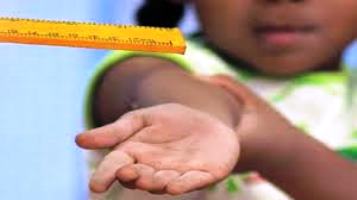As the world commemorates the International Day Against Corporal Punishment of Children, the Centre for Legal Rights Advancement (CLRA), a Non Governmental Organisation (NGO), has called for the abolition of the practice of all forms of corporal punishment in the country.
The founder of CLRA, Prof Ben Angwe, made the call in a statement issued in Abuja.
The International Day against Corporal Punishment of Children is observed April 30 of every year.
Angwe noted that the practice of all forms of corporal punishment in Nigeria was a serious violation of Child’s Rights Act 2003 and the International Convention on the Right of the Child, among other laws.
He said that relevant stakeholders should advocate the review of Section 295 of the Criminal Code, Section 55 of the Penal Code and other similar legislations that permit the use of force to correct children.
“These sections undermine the the relevant provisions of the Child’s Rights Act and other national laws, as well as related international treaties to which Nigeria is a signatory.
“Corporal punishment is against the Convention Against Torture and other Cruel, Inhuman or Degrading Treatment or Punishment.
“”This ugly practice constitutes an obstacle to the realisation of the right of the child to health, development, safe environment and education.
“Unfortunately, such acts are usually carried out by some parents, guardians, caregivers and teachers, in spite of legal provisions”.
Angwe who is a former Executive Secretary of the National Human Rights Commission (NHRC) regretted that Nigeria was not among the 65 countries out of about 199 that currently banned all forms of corporal punishment.
He commended the 36 states of the Federation for passing into Law the Violence Against Children Legislation and the majority of the states for adopting and passing into Law the Child’s Rights Act in their various jurisdictions, even as he urged them to ensure their smooth implementation.
He called on government at all levels and other stakeholders to double their collaboration to end corporal punishment in its entirety.
“I use this opportunity to condemn all forms of child rights violations including child trafficking, child labour and child abuse both at home and in school.
“Instead of indulging in such despicable practices, all decisions involving children should be taken in their best interest as enunciated in the Child’s Rights Act.
“There is a need to comply with the relevant national, regional and international laws prohibiting harsh or degrading treatment, and desist from spanking, hitting, punching, kicking, confinement in small spaces and subjecting any child to a fixed posture for long periods.
“Parents and other custodians of children should rather use verbal warning and make references to good moral conduct of persons of reputable character in the society, bearing in mind that an abused child is usually sad and could carry such a mood to adulthood with the attendant unpleasant consequences to the larger society”.
He, equally, commended the banning of corporal punishment in Europe, most parts of East Asia, South America and Zambia, urging Nigeria and other affected countries to adopt best practices in Child’s Rights Protection.



